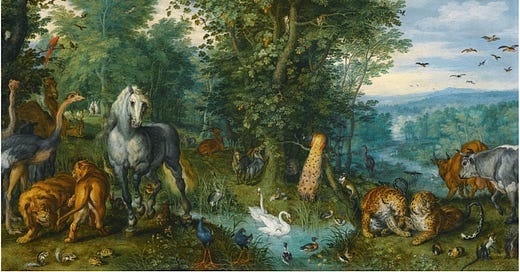A quick note: One of the subscriber features here at Close Reads HQ will be a monthly column from Heidi White in which she explores a theme that is near and dear to her heart (as longtime listeners of the show might know): the way duty and desire show up in literature. Each month she will be writing about how that idea is revealed in the work we are discussing on the podcast. But here in this first edition of the column, she explains why it matters so much to her, what she means by it, and what she hopes to accomplish in the column. Happy reading and thanks for supporting the Close Reads team when you subscribe!
Upon the wall above my desk hangs a collection of Christian icons. Icons depict sacred people, events, and theological truths. According to iconographers and devotees, icons are more than religious art. Rather, they are sacred artifacts, often described as “windows into heaven,” since it is believed that they are visual representations of spiritual realities. They point beyond this world, into a mysterious country that remains unknown and unexplored by the living. This raises the question: are there artifacts equivalent to icons that incarnate more mundane and immediate realities?
I think that the answer to that question is yes: stories. Like icons, the world’s great stories embody mystical and universal truths. Unlike icons, however, these truths are not always heavenly. They do not necessarily draw our attention to God, at least on the surface. Rather, they turn our eyes inward, into the nature of ourselves and this world. Stories are icons of human experience.
In this column, we will explore all manner of iconic stories—particularly the ones we read together on the podcast. This is easier than it might seem because it turns out that the embedded patterns of universal reality are really quite simple. By “simple” I do not mean simplistic, but elegant, understandable, universal. As Socrates once argued nearly 2,500 years ago, truth does indeed exist, it can be known, and—most importantly for the purposes of this column—it can be told. I will argue here that all enduring and honest stories across history explore one fundamental enigma that traces back to the foundation of the world. This essential human mystery is not academic, but existential, and thus lends itself to exploration through narrative rather than proposition. Interesting stories, after all, are not pedantic; they are far too risky and uncertain for that. Anything can happen in a story, but what is fascinating is that not anything does. Rather, the enduring stories of the world tend to distill down to universal preoccupations and premises. But why?
Keep reading with a 7-day free trial
Subscribe to Close Reads Podcast HQ to keep reading this post and get 7 days of free access to the full post archives.






